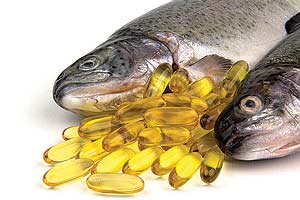Can fish oil actually increase your risk of prostate cancer? A new study raises the issue. Let’s take a look…
 Studies are published about cancer and its causes all the time. What one must do is evaluate the study for validity. The most recent study published on the potential link between omega 3 fatty acids (fish oil) and prostate cancer suggests that higher levels of these fatty acids raise the risk for prostate cancer. Unfortunately, the media grabbed the headlines and drew conclusions that were erroneous.
Studies are published about cancer and its causes all the time. What one must do is evaluate the study for validity. The most recent study published on the potential link between omega 3 fatty acids (fish oil) and prostate cancer suggests that higher levels of these fatty acids raise the risk for prostate cancer. Unfortunately, the media grabbed the headlines and drew conclusions that were erroneous.
Why? Well, the study used data from a previous research project that had different goals, calling into question the validity of comparing the data. This new study did not prove cause and effect, merely correlation of some data.
Mark Hyman, MD, a leading researcher and clinical practitioner, explains “What we can be sure of is that association does not prove cause and effect. If this had been an intervention design study, where half the participants got fish oil and half didn’t and they were followed for 20 years to see if they got prostate cancer, then you can say pretty definitively that they are connected. Bottom line, this type of study does not prove cause and effect. If I did a study on sunrise and humans waking up, I would find 100% correlation, but that doesn’t mean that the sun came up because you woke up. Correlation, yes; causation, no.”
 What about men who have really high intake and levels of omega 3 fatty acids? Some of the highest levels can be found in Japanese men. They certainly eat their fair share of fatty fish and have done so for generations! The Japanese (and other fish-loving cultures) have been studied many times to test this hypothesis, and guess what? Males in Japan, while having some of the highest levels of EPA and DHA, also have some of the lowest rates of prostate cancer.
What about men who have really high intake and levels of omega 3 fatty acids? Some of the highest levels can be found in Japanese men. They certainly eat their fair share of fatty fish and have done so for generations! The Japanese (and other fish-loving cultures) have been studied many times to test this hypothesis, and guess what? Males in Japan, while having some of the highest levels of EPA and DHA, also have some of the lowest rates of prostate cancer.
Bottom line: do not rush to conclusions based on headlines. Take a closer look at the underlying science presented. To do this, you can always call an RN Patient Advocate who will help you learn the real story.
You can learn more about the facts of this issue here. . .
 Studies are published about cancer and its causes all the time. What one must do is evaluate the study for validity. The most recent study published on the potential link between omega 3 fatty acids (fish oil) and prostate cancer suggests that higher levels of these fatty acids raise the risk for prostate cancer. Unfortunately, the media grabbed the headlines and drew conclusions that were erroneous.
Studies are published about cancer and its causes all the time. What one must do is evaluate the study for validity. The most recent study published on the potential link between omega 3 fatty acids (fish oil) and prostate cancer suggests that higher levels of these fatty acids raise the risk for prostate cancer. Unfortunately, the media grabbed the headlines and drew conclusions that were erroneous.
Why? Well, the study used data from a previous research project that had different goals, calling into question the validity of comparing the data. This new study did not prove cause and effect, merely correlation of some data.
Mark Hyman, MD, a leading researcher and clinical practitioner, explains “What we can be sure of is that association does not prove cause and effect. If this had been an intervention design study, where half the participants got fish oil and half didn’t and they were followed for 20 years to see if they got prostate cancer, then you can say pretty definitively that they are connected. Bottom line, this type of study does not prove cause and effect. If I did a study on sunrise and humans waking up, I would find 100% correlation, but that doesn’t mean that the sun came up because you woke up. Correlation, yes; causation, no.”
 What about men who have really high intake and levels of omega 3 fatty acids? Some of the highest levels can be found in Japanese men. They certainly eat their fair share of fatty fish and have done so for generations! The Japanese (and other fish-loving cultures) have been studied many times to test this hypothesis, and guess what? Males in Japan, while having some of the highest levels of EPA and DHA, also have some of the lowest rates of prostate cancer.
What about men who have really high intake and levels of omega 3 fatty acids? Some of the highest levels can be found in Japanese men. They certainly eat their fair share of fatty fish and have done so for generations! The Japanese (and other fish-loving cultures) have been studied many times to test this hypothesis, and guess what? Males in Japan, while having some of the highest levels of EPA and DHA, also have some of the lowest rates of prostate cancer.
Bottom line: do not rush to conclusions based on headlines. Take a closer look at the underlying science presented. To do this, you can always call an RN Patient Advocate who will help you learn the real story.
You can learn more about the facts of this issue here. . .





Recent Comments